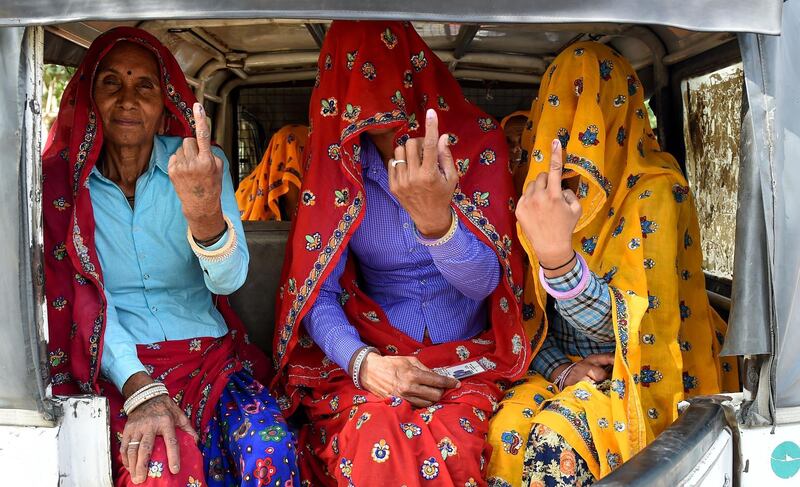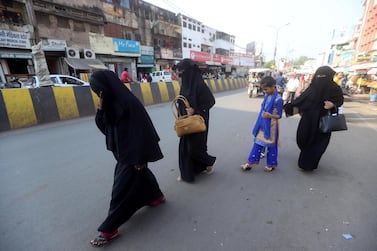India held the fifth stage of its marathon general election on Monday, with 90 million people eligible to vote in key seats for Prime Minister Narendra Modi's party and security heavy in restive Kashmir.
The world's biggest democratic exercise has been plagued by violence, with militants throwing a grenade at a voting booth in Kashmir and shooting dead a candidate over the weekend. Last week 15 paramilitaries and their driver were killed in an attack by Maoist rebels in Maharashtra state.
India's electorate of 900 million is casting votes in seven stages between April 11 and May 19, with the results due on May 23.
In the 2014 election, Mr Modi's Bharatiya Janata Party (BJP) won 39 of the 51 constituencies up for grabs on Monday, as he swept to power and the opposition Congress party suffered its worst ever result.
These include 14 seats in Uttar Pradesh, India's most populous state with 220 million inhabitants, part of the backbone of Mr Modi's support.
But late last year Congress won state elections in three other states in the region, boosting its hopes of unseating the BJP.
In recent days Mr Modi and Rahul Gandhi, the Congress leader, have engaged in acrimonious exchanges, with the prime minister attacking Mr Gandhi's assassinated father, former prime minister Rajiv Gandhi.
"Your father was termed 'Mr Clean' by his courtiers, but his life ended as corrupt number 1," Mr Modi said at a rally, linking Rajiv to a major defence purchase scandal during his tenure.
"Your Karma awaits you. Projecting your inner beliefs about yourself onto my father won't protect you. All my love and a huge hug," Mr Gandhi tweeted in response.
Mr Gandhi has called Mr Modi a "thief" over alleged irregularities in a multi-billion dollar deal to purchase 36 Rafale fighter jets from France's Dassault Aviation.
Tens of thousands of extra security forces were mobilised in areas of Indian-administered areas of Kashmir that were voting on Monday. The restive Muslim-majority region has seen decades of insurgency seeking either independence or to join Pakistan.
Militants on Monday threw a grenade that exploded near a voting booth, although no one was injured. On Saturday night Gul Mohammad Mir, who belonged to a local unit of the BJP, was shot dead at his house in south Kashmir. Protesters in the Pulwama area of Kashmir threw stones at election staff on Sunday as they were brought to the polling stations under heavy security. Police fired at the crowds, injuring at least two people, and polling staff were later transported in helicopters for their safety.
Voter turnout in the region so far has barely crossed 10 per cent. The separatists have called for a boycott and on Monday only a trickle of voters showed up – just over one per cent by mid-day, an election official said.
Also voting on Monday was Amethi, the constituency in Uttar Pradesh held by Mr Gandhi for the past 15 years and long considered an electoral stronghold for the Gandhi-Nehru political dynasty that has given the country three prime ministers since independence in 1947. The BJP candidate Smriti Irani, a former actress turned politician, is the Mr Gandhi's main challenger for the seat.
The Congress leader is also contesting from Wayanad constituency in the southern state of Kerala.
His mother Sonia Gandhi, 72, the Italian-born former head of Congress, is contesting from Rae Bareli near Amethi, which was also voting on Monday.
Mr Modi has made national security and fighting terrorism his main campaign theme to blunt opposition attacks on his economic record. He is seen as favourite to win – albeit with a reduced majority, meaning he may have to seek alliances with other parties.
Analysts say Mr Modi's nationalist rhetoric has resonated deeply in the north. The BJP victory in 2014 with an overwhelming majority was based largely on its strength in northern states, particularly Uttar Pradesh.
The party has run a campaign highlighting Mr Modi's tough stand against rival Pakistan following a suicide bomb attack by a Pakistan-based militant group that killed 40 Indian paramilitary police in Kashmir in February. Party members have also been accused of playing on communal tension, in particular between majority Hindus and minority Muslims, in Uttar Pradesh.






